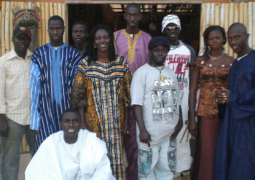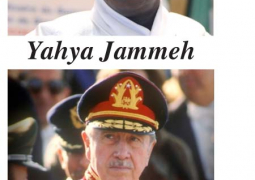Women Vegetable Growers in Darsilami, Sandu District, Upper and Lower River Region say the intervention is improving lives and livelihoods in the community. They made the remarks recently during an interview with GRTS.
According to them, the intervention has reduced poverty, food insecurity and malnutrition in their village.
They said the MDG1c project has, in addition to the perimeter fence for the five hectare garden and the bore hole, provided them with inputs such as seeds, wheelbarrows, weighing scale and watering cans.
They told the state broadcaster that these inputs, facilities and technical support from the project have enabled them to produce vegetables twice in a year using good and sustainable gardening practices.
They said all the 150 women farmers working on the site have realised improved yields and income and have virtually achieved economic independence.
They also said thanks to the intervention, they are now able to consume more vegetables on a daily basis than those living in the urban areas can afford.
“We also use income from the garden to pay for our children`s education, ploughing services for upland crops and other household needs.
The most important benefit that is not measureable is the prevention of animals’ intrusion in to the garden,” they explained.
The lady president Mariama Sillah also shared her success story with the media. According to her, she earned D70,000.00 from her pepper produce commonly known as “Guwana”.
She further noted that for the rainy season vegetable production the minimum earned by each woman in the garden was D5,000.00. Dusu Janko said she earned D36,000.00 when she sold her onions alone.
She also harvested 30 pans of bitter tomato and 25 pans of eggplant.
Another female vegetable grower also earned D42,000.00 from her onion produce. Kobai Nyabally a vegetable grower described the MDG 1c project as timely.
She said the intervention is impacting positively on their lives, as they are able to solve most of the domestic problems at household level.
An extension worker Babucarr Njie and the Project`s agronomist Ansu K. Ceesay have challenged men to embrace vegetable production and contribute towards the attainment of FAO`s goal of a world without hunger.
The women farmers cited lack of access to market, low prices for their produce, inadequate knowledge on production and marketing, inadequate storage and processing facilities, inadequate simple farm tools and quality seeds as the major constraints hindering vegetables production in the country.
Mariama Sillah, head of the women farmers, appealed for support from the government and development partners to help more women to address these problems for the realization of the desired goals.
Read Other Articles In Article (Archive)
A Valid Question Deserves an Answer
Apr 14, 2008, 4:25 AM



